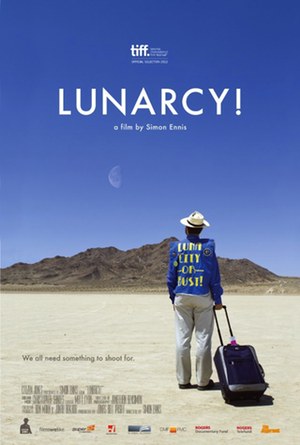Lunarcy: is the idea of lunar settlement crazy?by Jeff Foust
|
| Lunarcy! focuses on people who are closer to the fringes of the discussion about lunar settlement—if, in some cases, they’re even a part of it at all. |
Those questions came to mind during a recent screening of the documentary Lunarcy!, by Canadian filmmaker Simon Ennis. The film follows several people with a strong interest in returning to, and settling, the Moon. It’s certainly a serious topic that’s frequently debated in technical and policy circles in the space community: when should we return to the Moon, and how? This film, though, is not about those debates.
Instead, Lunarcy! focuses on people who are closer to the fringes of that discussion—if, in some cases, they’re even a part of it at all. Among those featured in the film is Peter Kokh, whose Moon Miners Manifesto newsletter has examined the various issues of lunar settlement for a quarter of a century. Also included, for better or worse, is Dennis Hope of the infamous Lunar Embassy, which sells plots of land on the Moon (not formally recognized, of course, by any governments). The film has shorter segments with people like Apollo 12 astronaut-turned-artist Alan Bean, space advocate Rick Tumlinson, and Jaymie Matthews, a Canadian astrophysicist who witnessed the Apollo 17 launch as a teenaged “youth ambassador.”
However, the star of Lunarcy! is a more obscure personality: Christopher Carson. If you’ve attended a meeting in recent years like Space Access or the International Space Development Conference, you may have encountered Carson wearing his distinctive blue vest (seen on the movie poster) with “Luna City or Bust!” inscribed on the back. Carson leads The Luna Project, an effort to establish a permanent settlement on the Moon. The effort doesn’t seem to have made much progress in the last few years, as the website mentions that it is “both feasible and desirable that the first party of pioneers depart before the end of July 2012.” That, though, has not deterred Carson from trying to build interest in the project—to spread the gospel of lunar settlement, if you will—in widening circles tracked in the film: from Space Access to a Worldcon science fiction convention to a group of high school students to, finally and quixotically, in the middle of Times Square in New York. These efforts don’t appear particularly successful in attracting supporters or funding, but Carson remains devoted to achieving his goal throughout. (The film does reveal, later on, one other factor that can help explain his monomaniacal focus on lunar settlement.)
| “I certainly hope that the commercial space ventures are successful, and soon, because I’d love to go to space and I’d love to go to the Moon,” Ennis said after a screening. |
In a discussion after a screening of the film two weeks ago in Washington during the DC Environmental Film Festival, shortly after its US premiere at South by Southwest in Austin, Texas, Ennis said he had originally planned to do a more straightforward documentary about the influence the Moon has had on society. However, as he started interviewing people, he got more interested in their individual stories. And, certainly he’s put together an interesting cast of characters, which is bound to make for a more entertaining film. (Speaking about Hope in particular, Ennis said that he was serious about his lunar property and lunar government plans throughout three days he spent with him filming. “If it’s all a joke,” Ennis said of Hope, “he’s a fantastic actor.”)
The concern, though, for space advocates is that people who see Lunarcy! may perceive any effort, government or commercial, to explore and settle the Moon as not particularly serious. The comments and actions of people in the film triggered laughter from the audience at the Washington screening. Were they laughing at those specific actions, or the general concept that people may one day return to the Moon to live there?
Ennis, in the post-screening discussion, said he hadn’t thought much about space before making the film, but now considers himself something of a fan of commercial space endeavors. “I certainly hope that the commercial space ventures are successful, and soon, because I’d love to go to space and I’d love to go to the Moon,” he said. He and his film crew bonded with Carson as they followed his travels around the country and have remained in touch since the completion of the film.
While Ennis is clearly sympathetic to commercial spaceflight and lunar exploration and not poking fun at them, that may not translate to those who view the film without the benefit of his comments. And there lies the struggle for space activists, who try to win support for more serious lunar ventures, like Google Lunar X PRIZE teams and startup company Golden Spike, when the media attention is often on those on the fringes of credibility. At the very least, though, we can see Lunarcy! as a celebration of the passion and dedication its participants have for a literally out-of-this-world goal, one that they may not themselves achieve but something that, over time, will transition that gray area towards respectability.
